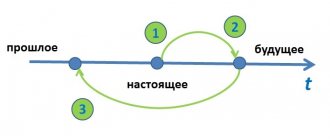Hello, dear readers! In the “About Me” article, I wrote that I decided to use this online diary for my microresearch. And today I’m posting my first note in this section. Some people may think, based on my age, that the topic of today’s post is very stupid, but I don’t think so.
Responsibility occupies an important place in a person’s life, so everyone needs to know this concept. I think that at any age it is worth stopping and putting your thoughts in order, putting everything in order.
So what does it mean to be responsible? You can, of course, write briefly and end here: learn to take responsibility for your actions. Still, I think this concept includes something more.
Responsibility in human life: examples from life
One day I began to remember examples of responsibility from life, or rather, my irresponsibility and my search for the meaning of these concepts, the following points emerged in my memory. When I was five, my mother, walking me outside, once said:
“Be smart, play near the house, take care of your toys. You are responsible for them."
And at first I really took responsibility for them with bitterness: I didn’t allow anyone to touch them, I fought for them and screamed wildly. I very quickly got tired of being responsible for my toys, and besides, almost all the children stopped playing with me.
As a result, I didn’t become greedy anymore, and the boys and I, while playing, broke and lost all my toys. For such irresponsibility, of course, I got screwed, and yet I still didn’t understand what it meant to be responsible for toys and not to be greedy at the same time.
The next example of responsibility from my life is the period when I had a brother: then I often had to stay with him and go for walks, from that time on I mostly went with him. I was always with my brother and was responsible for him, as I was again told.
One day, while playing in the sandbox, I didn’t notice how he left the playground. When he realized it, his brother had already managed to escape into the neighboring yard. Well, then I got it...
However, I again did not understand what it meant to be responsible for another when I so wanted to play myself. I so wanted to go for a walk without my brother, I so wanted to be irresponsible!
Once, when I was already a teenager and was visiting my grandfather, he instructed me to open the greenhouse in the morning and water the beds. Of course, I promised that everything would be done. He needed to leave for some important business, but for me it was complete freedom. At that time, not only did I have a brother at home, I also had a sister. Therefore, I was glad to get out to my grandfather, and now I was left completely alone for the whole day!
All the neighborhood kids found out about this in advance and invited me to swim in the river with them. So we had a blast then... So I got it later... Here my grandfather very clearly explained to me, with the help of a strong and wide soldier’s belt, what responsibility means in a person’s life and what can follow from breaking a given promise. Imagine the state of tomatoes that stood closed in a greenhouse in 30 degree heat almost all day!
Further, when I left my home village of Chunsky to study in Irkutsk, I was still vaguely aware of all the responsibility that I was taking for myself. It’s hard to imagine now how I even managed to graduate from college, being unadapted to living alone in a foreign city. At first I was in an intoxicating euphoria from the freedom that had befallen me. I just didn't know what to do with her.
I think it was only thanks to the kind people who surrounded me at that time and the experienced teachers who cooled my ardor that I did not do anything stupid. And, of course, one cannot fail to take into account the daily routine of a student at our college, the essence of which is to load everyone to the fullest. Group classes in the morning, individual classes in the afternoon, and later preparation for the next day. The button accordion helped a lot, as I could sit at it for hours, learning new pieces.
[[widget_id=23]]
In my case, the concept of responsibility in a person’s life was partially revealed with the advent of my family. After college, I immediately got married and a year later my daughter was born. I immediately remembered the practice from the age of 5 about toys: you need to take care of your things yourself, they have their own places. It also helped that I spent almost my entire childhood as a nanny for my brother and sister. Now caring for your own child was not difficult.
Practicing tomatoes from a young age helped me gain perspective on my decisions. I came to the realization that my actions or inactions today affect the future.
If I learned to take responsibility for other people with grief, then I have yet to comprehend taking responsibility for myself. Of course, I am exaggerating somewhat here, because I believe that over time we all come across positive examples from books or from the lives of other people and realize for ourselves the importance and advantage of the concept of responsibility in human life.
Classification
The term was first introduced by Alfred Bahn. He interpreted the concept in terms of punishability. For a long period, this problem was the subject of discussion among legal scholars exclusively in this aspect. Modern legal theory divides responsibility into positive and negative. The first is formed from a positive behavior model. It assumes useful functions for society. Its implementation takes place in regulatory relations. In them, the obligated subject is in a position of control and accountability. Negative liability arises from violations of regulations. In this case, the subject is subject to certain sanctions, and unfavorable consequences arise for the perpetrator. This classification made it possible to identify two sides of legal responsibility:
- Prospective. It occurs for the intended or committed proactive, active activity in accordance with the status to achieve certain goals.
- Retrospective. Such liability arises as a result of violations.
What does it mean to be responsible?
So what does it mean to be responsible? And how does this manifest itself in everyday life? After reading several smart articles in search of an answer, I identified several definitions for myself.
Being a responsible person means becoming able to consciously make decisions, become more collected, punctual, complete everything on time and always ready, if necessary, to help others. Most importantly, a responsible person accepts the consequences of his actions and decisions. What is a person's responsibility?
- for example, when carrying out various assignments, completing them on time correctly and efficiently;
- resolution of conflict situations in the family and at work. Being responsible in this case means taking control of the situation yourself, and not letting everything take its course and not waiting for someone else to take the initiative;
- leadership positions always require a person to have responsibility;
- the more this quality is demonstrated by a leader, the more stable and confident his activities are, the more united his team is;
- Responsible parents usually always have family relationships under control.
So what is human responsibility?
- As I said at the very beginning, responsibility is, first of all, the obligation to answer for the consequences of one’s decisions and actions.
- Responsibility is the willingness to make decisions in difficult situations, not only for oneself, but also for other people.
- Responsibility is directly related to the promises we make to ourselves, our family, colleagues, etc.;
- Responsibility is a human quality that manifests itself in the awareness that only we ourselves are responsible for our success, fulfillment and quality of life;
- When we talk about responsibility, we mean understanding that what happens in our lives is the result of our action or inaction.
- Personal growth and professionalism, success and quality of life depend only on whether we take responsibility for our decisions and actions;
- A sense of responsibility is a willingness to be responsible for one’s obligations and active participation in solving emerging difficulties. This may apply, for example, to family relationships, when we take responsibility for the family and its well-being.
Specifics
When explaining what responsibility is, researchers in scientific publications most often use terms such as sanity and accountability. In the legal literature, this phenomenon is considered mainly from the perspective of punishability. In practice, according to a number of authors, such a one-sided study of responsibility leads to significant deformations in the field of regulation of social relations. Foreign theory and practice, in addition to the indicated interpretations, provide more meanings. Among them, in particular, accuracy, responseability, dependence, certainty, and so on.
How to develop responsibility
Responsibility is not inherent in a person at birth, it is something that is acquired with age. Our sense of responsibility can be developed through examples from the lives of family members, friends, or even from what we watch on television.
However, we can hear and see many different things, both good and bad. That is why the sense of responsibility depends solely on us. We choose our behavior, actions and words.
So, responsibility is a skill that can and should be developed. Here are some tips I found on how to develop a sense of responsibility:
- communicate with children more often. When you are next to a child, you simply cannot be an irresponsible person. You constantly feel the need to protect, guide and help them. This can become a habit, and being responsible for another person will become much easier;
- control yourself, your emotions, thoughts. This does not mean limiting yourself in everything. You need to carefully monitor yourself, your words, promises and their fulfillment, and this is responsibility for your actions;
- teamwork. Here we learn patience for other people’s mistakes, we learn to perceive other people’s opinions not with hostility, but with respect. At the same time, the skill appears to defend one’s point of view and present reasonable arguments;
- You should always try to set a goal for yourself, outline tasks to achieve it and clearly set dates for their completion. This will help you control yourself and your time, and make a person responsible to himself.
Features of collection
In all of these cases, property liability can be applied in a “gentle” manner. For example, the judicial authority is able to reduce the amount of compensation for harm caused depending on the financial situation of the perpetrator. When collecting, the plaintiff himself can reduce the value of the claim or abandon it altogether. So he releases the guilty person from responsibility. The marital status of the defendant is also important. This is especially true for cases of recovery of damages from an employee of an enterprise.
Types of punishment
The list of penalties is established by Art. 3.2 Code of Administrative Offences. The following may apply to the perpetrator:
- Warning. It is a formal censure, issued in writing as prescribed by law.
- Fine. This sanction is expressed in a monetary amount, the amount of which is determined by a specific article that establishes liability for a specific violation.
- Confiscation of a weapon or object. A forcibly taken thing that was used in the commission of an offense or became the subject of an attack.
- Deprivation of special rights granted to an individual (for example, to drive vehicles, hunt, and so on).
- Arrest. Within the framework of the Code of Administrative Offences, this measure provides for keeping the perpetrator in isolation for 15 days. In case of violation of the state of emergency or the regime in the zone of the counter-terrorism operation - up to 30 days.
- Expulsion from the Russian Federation of a stateless person or a foreigner.
- Disqualification. It represents the deprivation of the offender’s right to hold certain positions (to be on the board of directors, to perform activities related to the management of the organization, etc.).
- Prohibition on attending official sporting events on the days of the event.
- Suspension of activities.
Administrative penalties
The current codes provide for different sanctions for certain violations. Criminal liability is considered the most severe. The Code of Administrative Offenses establishes punishments for subjects who have committed administrative violations. They recognize the guilty behavior of an organization or individual, for which the code provides for sanctions. The main signs of an administrative offense are:
- Act. It is an act of conscious, volitional behavior. It is expressed in the form of action (for example, smoking in the wrong place) or inaction (for example, failure to appear at a court hearing for jury duty).
- Antisocial character. It is expressed in an encroachment on the interests of the citizen, society, and state. A generalized list is given in Art. 1.2 of the code.
- Guilt is a construct similar to criminal law. It includes intent and negligence.
- Illegality. It is expressed in a situation in which the object of encroachment represents a specific value for society, the individual and the state and is protected by law.
When considering an administrative offense, the concept of punishability becomes important. If available, the sanction acts as an established state measure of responsibility for the act.









